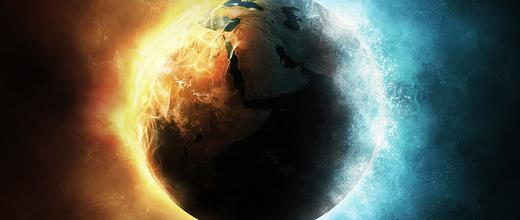The views expressed in our content reflect individual perspectives and do not represent the authoritative views of the Baha'i Faith.
We know something important from fossil and geological records: our common ancestors came from a world that turned very cold soon after their emergence.
Luckily for us, they survived in Africa, which was then a mildly temperate region, when much of the northern hemisphere of the planet became uninhabitable, frozen in mile-deep ice.
How did that work? Well, Earth’s most recent glacial period—which most of us call the Ice Age—happened during the last thousand centuries of the Pleistocene Era, from approximately 110,000 to around 12,000 years ago. Modern humans—homo sapiens sapiens—only evolved as recently as 163,000 years ago, a relatively short time before the world began to turn very, very cold.
In about 10,000 BC, when the ice began to recede as the Earth’s climate started a cycle of natural warming again, scientists believe that our human forefathers and foremothers began their migrations out of Africa to Asia, Europe, Australia and the Americas. Driven by heat, drought, an expanding human population and the normal cycle of climactic variation, those peoples sought a better life for themselves and their families, becoming the first migrants.
If you think about it, we all owe our existence to the bravery and courage of those ancient people, our common ancestors—and to the climactic conditions that made their lives and the growth of our species possible. Can you imagine the spiritual challenge such a potentially dangerous exploration of the vast unknown must have posed for them? Can you imagine what it took to simply survive? For their tenacity and their audacity, we owe them our gratitude, and our lives.
The Baha’i teachings ask us all—no matter what our ethnicity, skin color or national origin—to see ourselves as the progeny of those original people, as one human family:
We must consider all as the leaves, branches and fruit of one tree, children of one household; for all are the progeny of Adam. – Abdu’l-Baha, The Promulgation of Universal Peace, p. 174.
That combination of receding cold and advancing heat has immediate relevance today. Our seven billion relatives here on planet Earth now face a similar and equally daunting spiritual challenge—while the world’s glacial ice and polar regions melt, we now have to find a way to deal with rapidly-rising global heat.
Beyond the natural fluctuation in global temperatures, and for the first time in human history, our planet is warming very quickly, far above any previously-recorded levels. Scientists generally agree that this change in our climate, caused in large part by human activity, comes primarily from the burning of fossil fuels and the build-up in Earth’s atmosphere of their greenhouse gases. This threatens us all, and challenges our sustainability as a species. The democratically-elected international governing body of the Baha’i Faith, the Universal House of Justice, recently wrote:
Scientific inquiry into the question of human contributions to global warming has gradually unfolded over a century of investigation and, more recently, with intense scrutiny. While there will naturally be differences of view among individual scientists, there does exist at present a striking degree of agreement among experts in relevant fields about the cause and impact of climate change. – 29 November 2017.
If you read the Fifth Assessment Report by the Intergovernmental Panel on Climate Change, which you can find at the IPCC’s website, you will understand what the Universal House of Justice means. Produced by over 600 scientific experts from 32 countries, approved by 195 nations, the report synthesizes over 9,200 scientific publications and takes into account 54,677 comments from 1,089 scientist-reviewers—which makes it one of the most rigorously-reviewed scientific documents in history.
The IPCC report categorically concludes that the warming of our world is unequivocal, and that over recent decades human actions have been the primary cause. Climate change isn’t just a theory or a belief—it’s scientific fact, confirmed by the overwhelming preponderance of the world’s scientists.
The Latin word sapiens means “wise,” and since science has labeled us doubly-wise, we humans need to wisely address this enormous global distress signal we’re getting from our own planet. But first, we need to define it—is climate change a technological threat, a scientific challenge, a problem of industrialized capitalism, a concomitant of overpopulation, a policy and political struggle, an energy issue?
The scientific consensus answers yes to all those questions—but that doesn’t get us anywhere closer to real solutions. So the solutions, many experts have concluded, won’t be primarily technological in nature—instead, we might want to start considering climate change as a chiefly spiritual problem, a conundrum borne out of our collective failure as a species to respect, care for and honor the Earth’s environment. Driven by materialistic excess, the power of multinational corporations to pollute, the lack of political will or foresight and ultimately by the behavior of everyone on the planet, the true solution to climate change will require action on everyone’s part.
You—yes, you—can actually have a meaningful personal impact on this enormous challenge facing all of the descendants of Adam and Eve. Please follow along in this series of essays to find out how.

















Comments
Sign in or create an account
Continue with Facebookor